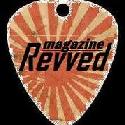
SCENE: Phoenix, Arizona, in the early ’90s. David (DLB) Bowers is honing his studio chops, recording local hip-hop acts and listening to rock, dreaming of the day he can mix everything he knows and loves together in a project that will reflect his passions. He meets a kindred spirit in fellow MC Doug (Rid) Moore, and the dynamic vocal duo eventually hooks up with fellow Phoenicians Sean Faulkner on bass, drummer Sean Gardner and guitarists Tracy (Tre) Thorstad and Cristin Davis to form Trik Turner. DLB was kind enough to sit down and speak with Album Network Rock Radio Director Michael D. Vogel (who is also a fan and outspoken supporter of Trik Turner) about his band’s history, their “keep it real” attitude, their self-titled debut and subsequent live experiences.

The dream goes something like this: You were born into a family with roots that can be traced back to Lightning Hopkins. You were a regular collaborator with both Vaughan brothers, as well as an active member of The Fabulous Thunderbirds and Arc Angels. If that wasn’t enough, you have co-written and/or recorded with rock legends like Eric Clapton, Roger Waters and B.B King.
A dream? Hardly–this has just been the past 18 months in the life of Doyle Bramhall II. And he’s only getting warmed up! Returning home from a European tour with Clapton, Doyle sat down to discuss the past, present and future of the man known as Bramhall.

The journey to find one’s self can often be a long and arduous task; the path to acknowledging who you are and what your contribution is can be even harder. Such has been the voyage for drummer Chris Layton and bassist Tommy Shannon, collectively known as Double Trouble. Stevie Ray Vaughan once said he was just a member of a band, a band called Double Trouble…and with his death came a void in the act that had revived blues/rock for a whole new generation.

The journey to find one’s self can often be a long and arduous task; the path to acknowledging who you are what your contribution is can be even harder. Such has been the voyage for Tommy Shannon and Chris Layton, collectively known as Double Trouble. Stevie Ray Vaughan once said he was just a member of a band, a band called Double Trouble…and with his death came a void in the act that had revived blues/rock for a whole new generation.

The journey to find one’s self can often be a long and arduous task; the path to acknowledging who you are and what your contribution is can be even harder. Such has been the voyage for drummer Chris Layton and bassist Tommy Shannon, collectively known as Double Trouble. Stevie Ray Vaughan once said he was just a member of a band, a band called Double Trouble…and with his death came a void in the act that had revived blues/rock for a whole new generation.

As the 21-century unfolds; it’s becoming more and more obvious that we have moved into a ‘cyber’ world. After all, even the most socially awkward individuals among us can now reach out and touch millions of people from around the world with the same relative ease as when the pick up a telephone. In the world of radio, a Program Director now has the opportunity to put his station on the ‘net with the hopes that millions from around the world will discover their station.
While few are lucky enough to hit the jackpot, Glen Gardner and the staff of WJJO Madison, WI. are one of the lucky ones who have struck pay dirt by successfully melding style, attitude and a touch of danger into a regional ‘terrestrial’ Rock station and turned it into a worldwide super-station. And the rest as they say, is cyber-history. Glen and his staff have elevated their station to #1 rated Rock station in their Arbitron market and a Top 25 ranking for time spent streaming. Not bad for a station less than 3 years old.

Anyone who has interacted with Kevin Vargas, PD of KISS San Antonio, knows him to be a consummate professional in every way. He immediately earns the respect, not only because of his undying passion of Active Rock radio, but also for his dedication to building the station into the powerhouse it has become.

His sound is unmistakable, his stance unforgettable. Notes stream from his guitar in metallic waves, occasionally softening into a feathery whisper. His voice is that of the six-string; as if being ripped from his throat, he screams tales of love, betrayal, hope, despair and all-night bacchanalia. It’s the blues at its most raw-nerved and ferocious–but look into the musician’s face as he gyrates and bends almost in half, doubling over to the floor. He breaks into a smile, eyes glistening with childlike joy.

Webster’s defines a sound system as: sound (n), a particular auditory impression; the sensation perceived by the sense of hearing. And system (n), a regularly interacting or independent group of items forming a unified whole; a group of interacting bodies under the influence of a related force. Just like any great sound system, the eclectic Los Angeles-based rock band 311 is comprised of five perfectly matched–yet independently functioning–components, which when operating as a well-tuned unit creates an undeniable musical force.

Here’s an anecdote straight out of suburban youth culture (yes, it’s a true story–we have all lived this scenario in some way shape or form!). Jake–who at 13 years of age believes he resembles nobody, much less a pre-pubescent Eddie Vedder–is being shuttled by one of his parents to a Thursday afternoon guitar lesson. This week, he’s decided to take something of a break; he’ll grapple with no items from The Beatles songbook, nor will he try to master any of the requisite Jimi Hendrix solos. Instead, he plans to exchange the 15 hard-earned dollars crammed into the left pocket of his baggy black shorts for instructions on covering The Clash’s “Should I Stay Or Should I Go.” At the moment, though, he’s staring out the car window, listening to 311′s Soundsystem CD.






















 Welcome to Michael D. Vogel’s online portfolio. I am a Los Angeles-based music journalist/content creator, and self-professed music-fanatic/radio-aholic. With more than 20 years of experience in multiple facets of the music industry including; music programming/air talent for terrestrial and internet radio as well as record label artist promotion, I have a finger on the pulse of what's new and under the radar in the emerging music scene. Areas of specific expertise include, but not limited to: rock (heritage, mainstream, heavy metal/hard rock and alternative), pop and adult contemporary, as well as radio, pop culture, sports, exercise and politics. I am applying my passion for music as a freelance writer for the Examiner as National Music Examiner (Examiner.com) in addition to West Coast Editor for FreeGotham (FreeGotham.com). Find me at michael@vogelism.com.
Welcome to Michael D. Vogel’s online portfolio. I am a Los Angeles-based music journalist/content creator, and self-professed music-fanatic/radio-aholic. With more than 20 years of experience in multiple facets of the music industry including; music programming/air talent for terrestrial and internet radio as well as record label artist promotion, I have a finger on the pulse of what's new and under the radar in the emerging music scene. Areas of specific expertise include, but not limited to: rock (heritage, mainstream, heavy metal/hard rock and alternative), pop and adult contemporary, as well as radio, pop culture, sports, exercise and politics. I am applying my passion for music as a freelance writer for the Examiner as National Music Examiner (Examiner.com) in addition to West Coast Editor for FreeGotham (FreeGotham.com). Find me at michael@vogelism.com. 